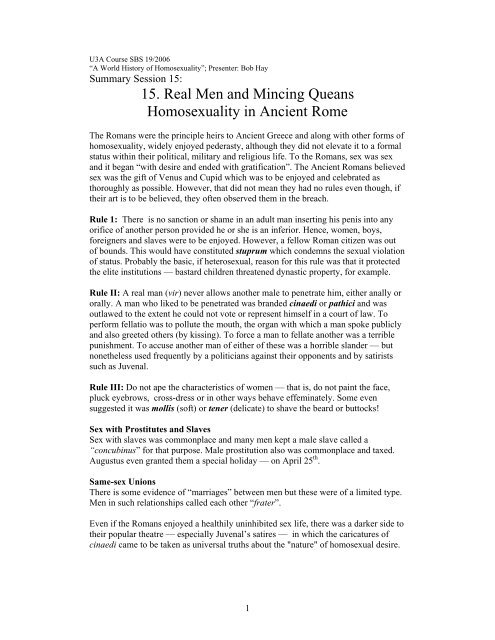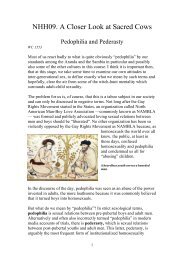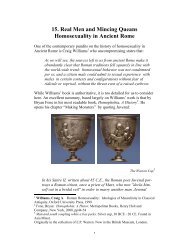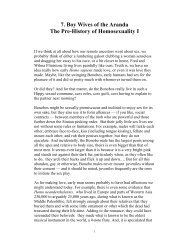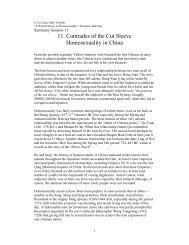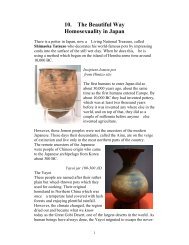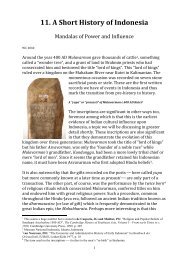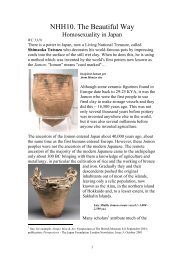15. Real Men and Mincing Queans Homosexuality in Ancient Rome
15. Real Men and Mincing Queans Homosexuality in Ancient Rome
15. Real Men and Mincing Queans Homosexuality in Ancient Rome
You also want an ePaper? Increase the reach of your titles
YUMPU automatically turns print PDFs into web optimized ePapers that Google loves.
U3A Course SBS 19/2006“A World History of <strong>Homosexuality</strong>”; Presenter: Bob HaySummary Session 15:<strong>15.</strong> <strong>Real</strong> <strong>Men</strong> <strong>and</strong> <strong>M<strong>in</strong>c<strong>in</strong>g</strong> <strong>Queans</strong><strong>Homosexuality</strong> <strong>in</strong> <strong>Ancient</strong> <strong>Rome</strong>The Romans were the pr<strong>in</strong>ciple heirs to <strong>Ancient</strong> Greece <strong>and</strong> along with other forms ofhomosexuality, widely enjoyed pederasty, although they did not elevate it to a formalstatus with<strong>in</strong> their political, military <strong>and</strong> religious life. To the Romans, sex was sex<strong>and</strong> it began “with desire <strong>and</strong> ended with gratification”. The <strong>Ancient</strong> Romans believedsex was the gift of Venus <strong>and</strong> Cupid which was to be enjoyed <strong>and</strong> celebrated asthoroughly as possible. However, that did not mean they had no rules even though, iftheir art is to be believed, they often observed them <strong>in</strong> the breach.Rule 1: There is no sanction or shame <strong>in</strong> an adult man <strong>in</strong>sert<strong>in</strong>g his penis <strong>in</strong>to anyorifice of another person provided he or she is an <strong>in</strong>ferior. Hence, women, boys,foreigners <strong>and</strong> slaves were to be enjoyed. However, a fellow Roman citizen was outof bounds. This would have constituted stuprum which condemns the sexual violationof status. Probably the basic, if heterosexual, reason for this rule was that it protectedthe elite <strong>in</strong>stitutions — bastard children threatened dynastic property, for example.Rule II: A real man (vir) never allows another male to penetrate him, either anally ororally. A man who liked to be penetrated was br<strong>and</strong>ed c<strong>in</strong>aedi or pathici <strong>and</strong> wasoutlawed to the extent he could not vote or represent himself <strong>in</strong> a court of law. Toperform fellatio was to pollute the mouth, the organ with which a man spoke publicly<strong>and</strong> also greeted others (by kiss<strong>in</strong>g). To force a man to fellate another was a terriblepunishment. To accuse another man of either of these was a horrible sl<strong>and</strong>er — butnonetheless used frequently by a politicians aga<strong>in</strong>st their opponents <strong>and</strong> by satiristssuch as Juvenal.Rule III: Do not ape the characteristics of women — that is, do not pa<strong>in</strong>t the face,pluck eyebrows, cross-dress or <strong>in</strong> other ways behave effem<strong>in</strong>ately. Some evensuggested it was mollis (soft) or tener (delicate) to shave the beard or buttocks!Sex with Prostitutes <strong>and</strong> SlavesSex with slaves was commonplace <strong>and</strong> many men kept a male slave called a“concub<strong>in</strong>us” for that purpose. Male prostitution also was commonplace <strong>and</strong> taxed.Augustus even granted them a special holiday — on April 25 th .Same-sex UnionsThere is some evidence of “marriages” between men but these were of a limited type.<strong>Men</strong> <strong>in</strong> such relationships called each other “frater”.Even if the Romans enjoyed a healthily un<strong>in</strong>hibited sex life, there was a darker side totheir popular theatre — especially Juvenal’s satires — <strong>in</strong> which the caricatures ofc<strong>in</strong>aedi came to be taken as universal truths about the "nature" of homosexual desire.1
Hadrian <strong>and</strong> Ant<strong>in</strong>oüs, Beloved <strong>and</strong> GodIt was dur<strong>in</strong>g Hadrian’s visit to Claudiopolis <strong>in</strong> the Roman Prov<strong>in</strong>ce of Byth<strong>in</strong>ia thatAnt<strong>in</strong>oüs crossed the peripetic Emperor’s path. At that time, the lad was 12, probablyborn on 27th November <strong>in</strong> 111AD. It is doubtful if Hadrian actually saw him: mostprobably he was recruited for the Emperor’s service <strong>and</strong> taken to <strong>Rome</strong> where he wastra<strong>in</strong>ed <strong>in</strong> the imperial pedagogium.Hadrian returned to <strong>Rome</strong>, to his villa at Tibur, <strong>in</strong> September 125 but three years later— <strong>in</strong> 128 — he once more travelled to Greece, this time with Ant<strong>in</strong>uoüs by his side ashis favourite. In Athens they both took part <strong>in</strong> the Eleusian Mysteries whichcelebrated death <strong>and</strong> re-birth. In 129 they left Athens <strong>and</strong> sailed to Asia M<strong>in</strong>or whereAnt<strong>in</strong>oüs returned for the first time to his home-town. From there they journeyedthrough Syria, Cappadocia <strong>and</strong> Armenia <strong>and</strong> the l<strong>and</strong> we now call Jordan. Then <strong>in</strong> thesummer of 130 AD, they entered Judea where Hadrian had plans to re-build Jerusalem<strong>and</strong> call it Aelia Capitol<strong>in</strong>a, but his plans for a new Roman temple dedicated to Jupiter<strong>and</strong> his ban on circumcision led to a revolt. Hadrian never really understood what hecalled the Jewish “stubbornness” <strong>in</strong> matters of religion so they left for Egypt. There,the Nile had not flooded adequately for two years <strong>and</strong> to make matters worse,Alex<strong>and</strong>ria gave Hadrian a poor welcome. The imperial party left for Libya on a lionhunt dur<strong>in</strong>g which Hadrian saved Ant<strong>in</strong>üous’ life.Back <strong>in</strong> Egypt, the party travelled down the Nile sightsee<strong>in</strong>g. Although there was littlewater, the Nile was technically <strong>in</strong> flood <strong>and</strong> it was sacrilege for Pharaoh to sail uponit at that time. Further, failure of the flood for two or more years signified the godswere unhappy with the pharaoh who, <strong>in</strong> the remote past, had been obliged to drownhimself <strong>in</strong> the river as human sacrifice. At Hermopolis Magna, Hadrian stopped tohave discussions with the priests of Thoth. It was also here that a 15-year-old girl,Isidora, had drowned <strong>in</strong> the Nile a year or two earlier but had atta<strong>in</strong>ed eternal lifebecause such was the gift of the Nile for those who perished <strong>in</strong> its waters. On theopposite bank of the Nile was a small settlement called Hir-wer. It was here, <strong>in</strong> thelast week <strong>in</strong> October 130, that the body of Ant<strong>in</strong>oüs was discovered, drowned likeIsadora <strong>and</strong> the ancient pharoahs, <strong>in</strong> the swirl<strong>in</strong>g waters of the Nile.There have been countless conspiracy theories but the mostprobably cause of Ant<strong>in</strong>oüs’ death was that he sacrificedhimself hop<strong>in</strong>g to prolong the ail<strong>in</strong>g Emperor’s life <strong>and</strong> toga<strong>in</strong> immortality so they could be together <strong>in</strong> an after-life.Devastated by his loss, Hadrian deified Ant<strong>in</strong>oüs <strong>and</strong> built acity, Ant<strong>in</strong>opolis at Hir-wer. The city’s importance decl<strong>in</strong>ed<strong>in</strong> the 7th Century after the Arab conquest but the ru<strong>in</strong>srema<strong>in</strong>ed almost <strong>in</strong>tact until Muhammad Ali used its stonesto build a sugar ref<strong>in</strong>ery. Ironically, the worship of theDiv<strong>in</strong>e Ant<strong>in</strong>oüs — the last pagan god of <strong>Ancient</strong> <strong>Rome</strong> —was progressively conflated with Christianity. There is evenan image of Ant<strong>in</strong>oüs <strong>in</strong> the guise of Dionysis, grapes (but no fig leaf) <strong>in</strong> one h<strong>and</strong>,<strong>and</strong> a cross <strong>in</strong> the other! Ant<strong>in</strong>opolis even had several Christian martyrs.2


